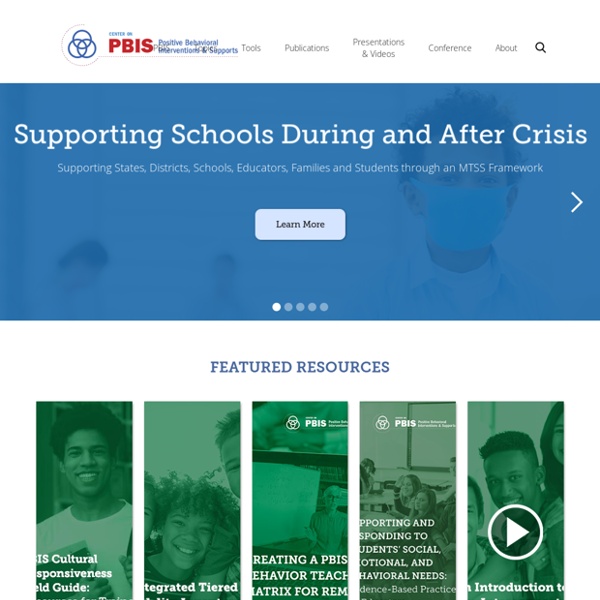



Kaupapa Māori / Welcome - Positive Behaviour for Learning Māori enjoying education success as Māori means having an education system that provides all Māori students with the opportunity to realise their own unique potential and succeed in their lives as Māori. In addition to culturally enhancing existing programmes, Positive Behaviour for Learning will contribute to the New Zealand evidence base through supporting and evaluating programmes developed by Māori. The following two Kaupapa Māori programmes are being trialled: Huakina Mai – combines whole-school and restorative practices approaches with a Kaupapa Māori world view.Te Mana Tikitiki – uses te reo and tikanga to provide a culture-rich medium to nurture mana in students. Both initiatives involve building partnerships with whānau and iwi.
RTI Response to Intervention (RTI) is a multi-tier approach to the early identification and support of students with learning and behavior needs. The RTI process begins with high-quality instruction and universal screening of all children in the general education classroom. Struggling learners are provided with interventions at increasing levels of intensity to accelerate their rate of learning. These services may be provided by a variety of personnel, including general education teachers, special educators, and specialists.
15 Steps to Group Project Success UDL Alignment How 15 Steps to Group Project Success aligns with UDL 15 Steps to Group Project Success was designed to address various concerns from all types of learners regarding collaborative work. The steps in this process are simple for students to understand which makes the learning and assessment process transparent and supportive of a variety of student learning profiles. This method can be applied to any group project in its entirety or just the steps that make the most sense for the instructor.
Intervention Central The Good Behavior Game is an approach to the management of classrooms behaviors that rewards children for displaying appropriate on-task behaviors during instructional times. The class is divided into two teams and a point is given to a team for any inappropriate behavior displayed by one of its members. The team with the fewest number of points at the Game's conclusion each day wins a group reward. MTSS A multi-tier system of supports (MTSS) is a phrase you may hear about at school or from other parents. You may hear it called the MTSS framework, the MTSS process or the MTSS model. No matter what it’s called, MTSS has a very important goal.
Learner Variability Project Accessible Syntax Teachers can support language development by using and providing Syntax that is appropriately leveled (e.g., short, simple structure for young students). Accessible Vocabulary Support material / PB4L Restorative Practice Restorative Practice Model Restorative Practice Model (PDF 52KB) Kete Book One Morning Meetings Responsive Classroom Morning Meeting is an engaging way to start each day, build a strong sense of community, and set children up for success socially and academically. Each morning, students and teachers gather together in a circle for twenty to thirty minutes and interact with one another during four purposeful components: Greeting: Students and teachers greet one other by name.Sharing: Students share information about important events in their lives. Listeners often offer empathetic comments or ask clarifying questions.Group Activity: Everyone participates in a brief, lively activity that fosters group cohesion and helps students practice social and academic skills (for example, reciting a poem, dancing, singing, or playing a game).Morning Message: Students read and interact with a short message written by their teacher. The message is crafted to help students focus on the work they’ll do in school that day.
Teamworking Skills All employers are keen to recruit graduates who are able to cooperate, solve problems [6]and work in teams. As less hierarchical organisations have emerged with project teams, self-managed work teams and management teams, so the requirements to 'Get on well with people', and to 'Work with and through others' become increasingly important. Teamwork involves working confidently within a group, contributing your own ideas effectively, taking a share of the responsibility, being assertive [7] - rather than passive or aggressive, accepting and learning from constructive criticism [8] and giving positive, constructive feedback to others. Exercise [9] on teamworking skills. The questionnaire which follows should help you to analyse the workings of a group and should help you to reach some tentative conclusions about your role in a team.
What is involved? / PB4L Restorative Practice The PB4L Restorative Practice model has three key interrelated components: Restorative Essentials, Restorative Circles and Restorative Conferences. The first and most fundamental component is Restorative Essentials, which is built on and further developed in the use of Restorative Circles and Restorative Conferences. PB4L Restoratve Practice Model Restorative Essentials embody the approach of the PB4L Restorative Practice model at the grass roots level - the everyday, informal actions that place emphasis on relationships, respect, empathy, social responsibility and self-regulation. The Restorative Essentials are a relational approach to effective communication skills and Restorative Conversations.